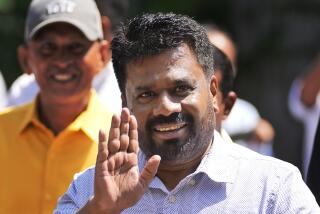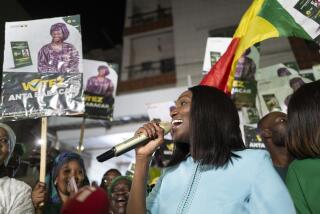Sirimavo Bandaranaike; World’s First Female Prime Minister
- Share via
COLOMBO, Sri Lanka — Sirimavo Bandaranaike, who 40 years ago became the world’s first female prime minister, died of a heart attack Tuesday after voting in Sri Lanka’s parliamentary elections. She was 84.
Bandaranaike, the mother of Sri Lankan President Chandrika Kumaratunga, voted in her hometown of Attanagalla and suffered a heart attack in her car on the way home, said government spokeswoman Kusum Rodrigo. She was pronounced dead after being taken to a nursing home.
“I think the entire nation has lost its mother,” said Alavi Mowlana, a government minister for local affairs. “I cannot believe that she is no more.”
A state funeral will be held Saturday, Prime Minister Ratnasiri Wickramanayaka told a news conference Tuesday. Wickramanayaka said the government had declared Friday and Saturday days of mourning and ordered the closing of all movie theaters, liquor stores, bars and butcher shops. He called on citizens to put up white flags of mourning.
Bandaranaike was elected the first woman head of government July 20, 1960--six years ahead of India’s Indira Gandhi. A three-time prime minister of Sri Lanka, Bandaranaike began her last term in 1994, but she resigned this August. She told the nation that her daughter needed someone more capable of pushing proposals to end the civil war, which has claimed about 63,000 lives since 1983.
Born Sirimavo Ratwatte on April 17, 1916, Bandaranaike was from one of this Indian Ocean island’s wealthiest families. In 1940, she married Solomon Dias Bandaranaike, a senior politician in the United National Party, which was governing what was then called Ceylon.
Her husband later broke away to form the Sri Lanka Freedom Party and was elected prime minister in 1956. A deranged Buddhist monk assassinated him three years later.
The slaying transformed his spouse from shy housewife into political dynamo. She campaigned for her husband’s party in the 1960 elections and became its leader.
Her election was so unusual that newspapers were unsure what to call her.
“There will be need for a new word. Presumably, we shall have to call her a stateswoman,” London’s Evening News wrote the day after her election. “This is the suffragette’s dream come true.”
Bandaranaike governed until 1965, lost the next election, then regained power in 1970.
In 1971 she used the military to crush an insurrection by Marxist rebels, and as many as 20,000 were believed to have died.
In 1972, she nationalized private companies and banned imports, which led to shortages of food, gasoline and other necessities.
That same year she made Sri Lanka a republic, severing the last constitutional links with Britain, which had ruled the country for 150 years before granting independence in 1948.
Bandaranaike is remembered for her statesmanship and for socialist policies during the Cold War years that some say prompted Sri Lanka’s economic regression.
She adopted major land reforms, restricting ownership to 50 acres, and placed a ceiling on ownership of property.
While trouble brewed at home, Bandaranaike was active on the foreign policy front. She used her influence with India and China to play a key role in defusing tensions between the two giants after their brief border war in 1962.
She was also one of the founding members of the Non-Aligned Movement and later worked closely with leaders such as Indira Gandhi, Egypt’s Anwar Sadat and Yugoslavia’s Marshal Tito.
In September 1961 at the Non-Aligned Movement talks in Belgrade, Yugoslavia, she made history by being the first leader to say she was speaking “as a woman and a mother.”
Parliament expelled her in 1980, accusing her of misusing power, and banned her from office for seven years. Her civic rights were restored in 1986, and she narrowly lost the election for the new, more powerful post of president in 1988.
Suffering from diabetes and a knee problem that put her in a wheelchair, Bandaranaike reduced her political activities.
In 1993, Kumaratunga took over the party’s leadership. When elected president a year later, she appointed her mother as prime minister, a position that has become largely ceremonial.
Bandaranaike is survived by three children: Kumaratunga; Anura Bandaranaike, a senior opposition candidate; and Senethra Bandaranaike, a philanthropist who is not involved in politics.
More to Read
Sign up for Essential California
The most important California stories and recommendations in your inbox every morning.
You may occasionally receive promotional content from the Los Angeles Times.













